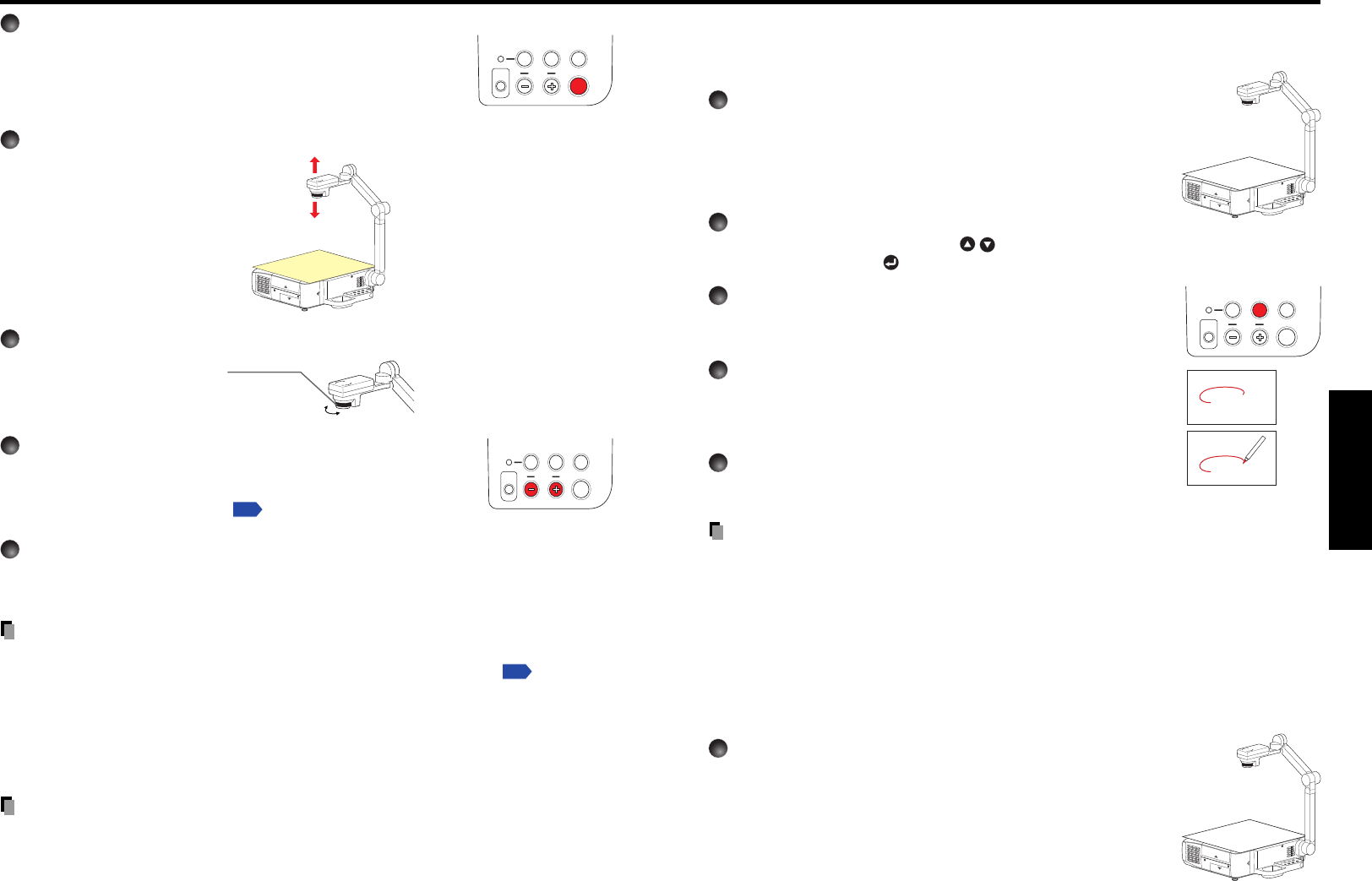
Operations
4746
O
N
/
S
T
A
N
D
B
Y
I
N
P
U
T
M
E
N
U
A
U
T
O
S
E
T
F
A
N
T
E
M
P
L
A
M
P
O
N
V
O
L
.
+
V
O
L
.
-
A
U
T
O
K
E
Y
S
T
O
N
E
W
.
B
A
L
A
N
C
E
O
V
E
R
L
A
Y
L
O
C
K
S
T
O
R
E
I
M
A
G
E
A
R
M
L
I
G
H
T
C
A
M
E
R
A
CA
M
E
R
A
GA
I
N
W.BALANCE OVERLAY
LOCK
STORE
IMAGE
ARM LIGHT
CAMERACAMERA
GAIN
RGB picture
O
N
/
S
T
A
N
D
B
Y
I
N
P
U
T
M
E
N
U
A
U
T
O
S
E
T
F
A
N
T
E
M
P
L
A
M
P
O
N
V
O
L
.
+
V
O
L
.
-
A
U
T
O
K
E
Y
S
T
O
N
E
W
.
B
A
L
A
N
C
E
O
V
E
R
L
A
Y
L
O
C
K
S
T
O
R
E
I
M
A
G
E
A
R
M
L
I
G
H
T
C
A
M
E
R
A
C
A
M
E
R
A
G
A
I
N
Using the document camera (Continued)
■ Using the overlay function
The overlay function can be used to write over computer or video input images.
Have a piece of white paper, and a red or blue pen ready.
1
Place the piece of white paper on a flat surface,
photograph it with the document camera, and
display it on the screen.
Adjust the camera head and arm so that the white paper fills
the screen.
2
Select the input that the overlay function is performed.
Press the INPUT button, use the buttons to select an input other than Camera
input, then press the
button.
3
Press the OVERLAY button.
The overlay function comes on.
(Press it again to turn off the function.)
4
Write on the paper with a red or blue pen.
Before writing, check the position of the pen tip on the screen.
The line written overlays the input source’s image on the
screen.
5
Use the CAMERA GAIN (+/–) button to adjust the lines
or text so that it is easiest to see.
Notes
• The writing will not be displayed properly if using colors other than blue or red.
• The writing may not be displayed properly if the pen is too fine.
■ Locking the white balance
Although the projector’s camera is constantly adjusting the color balance of the images
it photographs, the color balance may be disrupted, depending on the color layout of
the document, etc. If this happens, the white balance can be locked using the
procedure below.
1
Lay down a piece of white paper, and adjust so it fills
the screen.
Adjust the camera head and arm so that the white paper fills
the screen completely.
Screen
Paper
W.BALANCE OVERLAY
LOCK
STORE
IMAGE
ARM LIGHT
CAMERACAMERA
GAIN
W.BALANCE OVERLAY
LOCK
STORE
IMAGE
ARM LIGHT
CAMERACAMERA
GAIN
3
Press the CAMERA button, and select camera input.
• The input returns to the previous input when the CAMERA button
is pressed again.
• Camera input can also be selected by pressing the remote
control or camera’s INPUT button.
4
Move the camera head up and down to adjust the image size.
O
N
/
S
T
A
N
D
B
Y
I
NPUT
ME
N
U
A
U
T
O
S
E
T
FA
N
T
E
M
P
L
A
M
P
O
N
V
O
L
.
+
VO
L
.
-
AUTO
KEYS
TONE
W
.
B
A
L
A
N
C
E
O
V
E
R
L
A
Y
L
O
C
K
S
T
O
R
E
I
M
A
G
E
A
R
M
L
I
G
H
T
C
A
M
E
R
A
C
AM
E
R
A
G
A
IN
123
5
Use the camera head’s focusing ring to adjust the focus.
6
If the screen is too dark or too bright, use the
CAMERA GAIN (+/–) buttons to make it easier to see.
The Sharpness of the camera image can also be adjusted using
the Image adjustment menu
p.54
.
7
After use, turn off the light, and fold up the document camera.
Fold up the camera using the opposite order from Preparation of the document
camera.
PRECAUTION
• If the room’s fluorescent lighting causes the image to flicker, either turn off the
fluorescent light, or set the Shutter speed from the Auto setting menu
p.29
. Note that
changing the Shutter speed setting may not eliminate the flicker, depending on the
lighting, state of the document, or image adjustment.
• When arm light is used, document camera image of paper/object with reflective surface
may have bright spots. In this case, turn off the arm light and have an adequate lighting
from the room light.
Notes
• The camera light automatically goes off when the camera arm is collapsed.
• The camera will not output images when the camera arm is stowed.
• No audio is output when camera input is selected.
Closer: Larger image
Farther: Smaller image
Turn the focusing ring
to adjust the focus.
